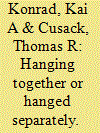| Srl | Item |
| 1 |
ID:
133718


|
|
|
|
|
| Publication |
2014.
|
| Summary/Abstract |
What is the strategic role of membership in an intergovernmental group with unanimity requirements if the group negotiates with an external player in a setting with incomplete information? Being in such a group has a strategic effect compared to negotiating as a stand-alone player and reduces the demands of the outside player. Group membership lends additional bargaining power. Negotiating as a group may also cause more inefficiencies due to bargaining failure, and this may harm also the intergovernmental group. We uncover the role of preference alignment and preference independence between members of the coalition group for equilibrium payoffs and welfare effects. In this analysis, we also distinguish between coalition groups with and without side payments. Overall, coalition groups tend to perform well for the members of the coalition group in comparison to fully decentralized negotiations, particularly if the objectives of the members of the coalition group are not always perfectly aligned.
|
|
|
|
|
|
|
|
|
|
|
|
|
|
|
|
| 2 |
ID:
079528


|
|
|
|
|
| Publication |
2007.
|
| Summary/Abstract |
We study the effects of leadership on the private provision of a public good when group members are heterogeneously endowed. Leadership is implemented as a sequential public goods game where one group member contributes first and all the others follow. Our results show that the presence of a leader increases average contribution levels but less so than in case of homogeneous endowments. Leadership is almost ineffective, though, if participants do not know the distribution of endowments. Granting the leaders exclusion power does not lead to significantly higher contributions
|
|
|
|
|
|
|
|
|
|
|
|
|
|
|
|
| 3 |
ID:
119245


|
|
|
|
|
| Publication |
2012.
|
| Summary/Abstract |
Uncertainty, or incomplete information, is a fundamental fact that makes life interestingly frustrating and frustratingly interesting. Not surprisingly, uncertainty has occupied a central place in social sciences, including international politics.1
In international relations (IR), uncertainty is not just a theoretical jargon that lumps together our ignorance. Rather, uncertainty underpins a pressing and enduring challenge for statesmen and students of IR-the challenge of understanding the (immediate and deeper) causes behind other states' behavior (and non-behavior). While statesmen tend to rely on some gut feeling to gauge the forces behind other states' moves, students of IR have tried to import the social psychology literature on attribution to build a framework for understanding other states' behavior. Unfortunately, the social psychology literature on attribution provides only limited mileages for addressing uncertainty in IR. As a result, existing discussion on attribution in IR suffers from some crippling deficiencies.
|
|
|
|
|
|
|
|
|
|
|
|
|
|
|
|
| 4 |
ID:
132754


|
|
|
|
|
| Publication |
2014.
|
| Summary/Abstract |
We study two electricity markets connected by a fixed amount of cross-border capacity. The total amount of capacity is known to all electricity traders and allocated via an auction. The capacity allocated to each bidder in the auction remains private information. We assume that traders are faced with a demand function reflecting the relationship between electricity transmitted between the markets and the spot price difference. Therefore, traders act like Bayesian-Cournot oligopolists in exercising their transmission rights when presented with incomplete information about the competitors' capacities. Our analysis breaks down the welfare effect into three different components: Cournot behavior, capacity constraints, and incomplete information. We find that social welfare increases with the level of information with which traders are endowed.
|
|
|
|
|
|
|
|
|
|
|
|
|
|
|
|